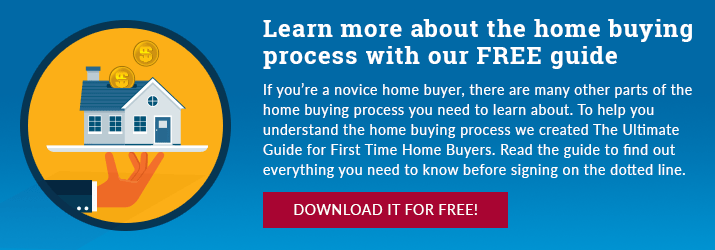
Breaking Down 4 Types of Mortgages for First Time Buyers
First time home buyers are estimated to make up 35% of all home purchases in 2017. Your first venture into the world of real estate can be overwhelming. One of the major sources of stress is deciding what type of mortgage you need for your situation. To help you narrow down your decision, here are the different types of popular mortgage loans explained.
Question to Ask Yourself Before Applying for a Mortgage
Ask yourself these questions to narrow down your financial priorities.
- How long do you plan on living in this home?
- Do you have money saved up for a down payment?
- Do you believe your income will stay the same or increase in the coming years?
- Are you looking for an interest rate that stays the same of will change down the road?
- What’s more important to you – a lower interest rate or a lower monthly payment?
Conventional Home Loans
Fixed-rate mortgages
This is the most common type of mortgage offered by financial institutions. They are backed by the lender and offer a set interest rate for the entire life of the loan. You can pick how long you want the loan term to be, whether 10, 15, or 30 years. Although keep in mind, the shorter the loan term, the higher the monthly payment. But if your term is stretched longer, you’ll end up paying more in total with interest.
For example –
$200,000 loan with a 3.79% interest rate
30yrs: $930.78/month | Total paid $335,080
10yrs: $2,005/month | Total paid $240,600
By paying it off 20 years early you save $94,480 in interest – but the monthly payments are much less affordable.
You also need to consider your down payment amount. If you can’t put 20% of the home’s purchase price up front, you’ll need to pay private mortgage insurance (PMI). Make sure to calculate this extra cost into your monthly budget. If you don’t have 20%, many lenders will still accept down payments as low as 5% if you agree to pay the PMI.
Ideal for: The buyer who can afford a minimum 5% down payment, prefers to know exactly what their monthly payment will be for the entire loan, and is planning to stay in their home for a long period of time.
Adjustable-rate mortgages (ARMs)
ARMs offer lower interest rates for the first portion of repayment than a fixed-rate loan. However, after the agreed upon period, the interest rate will adjust to the current market rate. If this rate is higher than the first rate, your monthly payments will increase. There are minimum and maximum caps on the interest rate within the mortgage agreement, so make sure you know just how expensive your rate could become before agreeing to an ARM.
You might see ARMs listed in numbers, like 5/1 or 10/3. This identifies how long the first interest rate will last until it starts adjusting. Then the second number identifies the length of time the rate will go before adjusting again. For example, if it is a 5/1 ARM, your first interest rate will last for 5 years. After the fifth year it will adjust, and then will adjust once a year thereafter.
Ideal for: ARMs can be great for families who are planning on moving before the first rate changes. This can give you a low monthly payment since the first interest rate is often lower than the national average.
Government-backed home loans
Federal Housing Administration home loans (FHA)
The government offers several mortgage options to home buyers. These loans differ from conventional loans in that they are backed by the government instead of an individual lender. The FHA home loan requires a smaller down payment than conventional loans, which make it a great option for first time home buyers. The minimum down payment is only 3.5%. However, you will still be required to carry PMI if your down payment is this small.
Ideal for: First time home buyers who can’t save up a large down payment.
VA home loans
If you or your spouse has served in the United States military, a Veteran Affairs home loan is your best bet. It comes with plenty of perks, including no down payment or PMI requirements. Plus, their interest rates are often lower than the national average.
Ideal for: A buyer who has served in the U.S. military and wants a great deal on a mortgage.
Your Next Home Buying Steps
If you’re still not sure which option sounds like the right choice, it’s always a good idea to talk it over with your chosen lender. Your mortgage specialist will be able to guide you in the right direction for your financial situation.
If you’re a novice home buyer, there are many other parts of the home buying process you need to learn about. To help you understand the home buying process we created The Ultimate Guide for First Time Home Buyers. Read the guide now to find out everything you need to know before signing on the dotted line. Download it for FREE!

-2.png?width=300&height=65&name=AFCU-logo-2019-white-sm%20(1)-2.png)